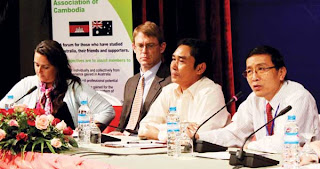When it comes to health care in Cambodia, nobody gets left behind – that was the theme of the Equity in Access to Health Services workshop, held on September 14 at the Phnom Penh Hotel. Government officials, NGOs, health experts and researchers gathered to discuss the future of the country’s public health-care services.
The Ministry of Health says it expects to provide basic coverage to all Cambodian nationals living under the poverty line by 2014.
Currently, 78 per cent of those living under US$1 a day are covered according to the Ministry.
The main strategy is the continuation of the Health Equity Funds (HEFs), a project that began in 2000.
The funds’ resources are provided to those who complete an interview process that establishes medical problems and financial standing (together with a poverty status that goes from very poor to poor).
Equity Cards are then issued to those who meet the proper criteria. With their cards in hand, people can access free health assistance, transportation to hospitals or health centres and food allowance for their caretakers.
The government operates eight national hospitals, 81 referral hospitals and more than a thousand health centres throughout the country.
According to Tapley Jordanwood, a community-based Health Program team leader who spoke at the event, the Cambodian public health system is by far the largest social protection mechanism in Cambodia.
He explained, however, there are still some gaps in the system.
“Some of the population are migrants, and some are homeless. So it’s not a perfect system,” Jordanwood said. “But as a start, I think it’s a very strong move by Cambodia to ensure some equity in targeting of social services.”
The government also plans for an information program to raise awareness of the health care system in the country’s more remote villages and among illiterate people.
In addition to informing villagers that such medical services are now available to everyone, the various media outlets like radio, television and pamphlets are also teaching them about the benefits of preemptive screening and early action.
Hopes for a better future were high at the conference, with many saying that they believe Cambodia is on the right path.
“I think this workshop was very useful, especially because it addressed important topics like equity and inequality in the health system,” said Ly Hok, Chief Officer of Physical Rehabilitation of the Ministry of Social Affairs.
As the Ministry of Health edges closer to achieving the universal coverage that it hopes for, there is a growing demand to improve the actual quality of the services which it provides.
“I think a lot of people this morning have highlighted the fact that sometimes we cannot wait for change, we want change now, and that’s when you start talking about quality of health care instead of coverage,” said one of the attendants to the workshop who chose to remain anonymous. “We have done very well with coverage, now we have to switch to improving the quality of health care.”
Chhit Kimhor, a water resources engineering consultant, voiced scepticism over the workshop.
“I think this workshop is very good in theory, but how efficient will it become in practice?” he wondered. “It’s hard to tell if it will not just remain up in the air.”

No comments:
Post a Comment